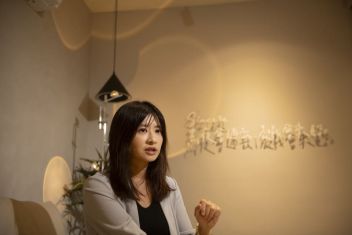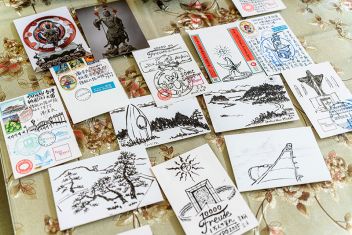
Angela Liu, managing director at Chun Shui Tea Group, began drinking tea as a child. She says that each hand-shaken drink contains a wealth of innovative ideas, reflecting the Taiwanese people’s versatility and ability to synthesize. These drinks represent Taiwan’s soft power.
In January 2023 Google celebrated bubble tea with an interactive doodle, bringing this iconic Taiwanese treat to the notice of the world. Each of Taiwan’s hand-shaken drinks shops has its own unique character, and the beverages they sell brim with creative ingenuity. Let’s see how Taiwanese drinks have taken the world by storm.
Statistics from the Ministry of Economic Affairs show that Taiwan’s drinks shops earned over NT$100 billion in 2022. According to the Ministry of Finance, the country was home to more than 28,000 drinks shops in November 2022. The density of outlets is astonishing.
While traditional Taiwanese culture actually favors hot tea, the fashion for cold beverages has swept over Taiwan within just a few decades, winning many hearts with an infinite variety of flavors. Exactly how did this phenomenal change happen?
Beginnings
Chun Shui Tang is an international teahouse chain with origins in Taichung. Founder Liu Hanjie remembers how his father, a medical practitioner, was always preoccupied with concern for his patients. Only when making tea did the old man show any sign of relaxation and even pleasure. These early memories planted in Liu’s mind the idea that “drinking tea makes one happy.”
Rather than following his father into the medical profession, Liu, an ardent tea enthusiast, visited tea producing areas across the world in order to gain an intimate knowledge of this ancient beverage. Considering the long history and wide distribution of tea, Liu thought he might carve out a successful career by setting up a tea business. Back then, however, there was a widespread perception that tea making required complex utensils and rituals. Accordingly, consumers of tea tended to be elderly, while younger people preferred simpler things like shaved ice and fizzy drinks. How to get the younger generations to embrace tea would be a major challenge for Liu.
During a visit to Japan, Liu saw a barista making iced coffee: he first carefully brewed the drink in a vacuum pot, then poured it into a cocktail shaker, popped in some ice, and shook it vigorously. Liu asked him to use the same method to make iced tea, but the barista refused, saying that tea should be drunk hot. Unconvinced, Liu went on to try it himself when he returned to Taiwan. This marked the beginning of the “bubble tea”—a.k.a. pearl milk tea or boba tea—that we all know today.
In 1983 Liu opened Yanghsien Tea Shop. Besides selling teaware, the shop had a small bar specializing in hand-shaken bubble teas. Customers started to fall in love with Liu’s iced teas. Sensing the commercial potential of these new beverages, Liu bought a property on Taichung’s Siwei Street and established Chun Shui Tang. Thus began a trend that was to transform Taiwan’s tea culture.

Under the leadership of Peter Huang (fifth from left), Milksha is devoted to making healthy and tasty drinks suitable for adults and children alike.
The charm
What exactly makes “hand-shaken” iced teas so different? Angela Liu, managing director of Chun Shui Tea Group (Chun Shui Tang’s parent company), tells us that the shaking process serves to integrate tea and ice and generate frothy bubbles, thus altering the character and taste of the drink. The soft, creamy foam enriches the texture of the tea. This is the secret to hand-shaken beverages’ charm.
A distinctive culture of hand-shaken drinks has since taken shape in Taiwan, with pearl milk tea being regarded as a classic of classics. Angela Liu, daughter of Chun Shui Tang’s founder, says that whereas many people feel that the concept of pearl milk tea was conjured up out of thin air, her father was actually inspired by the history of tea. Having discovered that our forebears used to put things like candied fruits and coriander in their tea, Liu Hanjie invited his colleagues to think about which ingredients would best appeal to modern tastes. As an experiment, Lin Xiuhui, then store manager and now Chun Shui Tea Group’s director of R&D, combined milk tea with her favorite tapioca balls (the “pearls” in pearl milk tea), which turned out to be a perfect match. Angela Liu says that the team tried almost every shaved ice topping they could lay their hands on, eventually deciding that tapioca balls, owing to their special texture, were the most suitable for hand-shaken drinks. So pearl milk tea was actually deliberately invented as a modern reinterpretation of the ancient practice of garnishing tea with flavorsome ingredients.
The art of Chun Shui
For Liu Hanjie, teahouses are oases in the city. The name “Chun Shui” means “vernal waters”—the first meltwaters of spring—evoking classical Chinese poetry: the Yuan-Dynasty writer Zhang Kejiu mentions “brewing tea with vernal waters,” and the Tang poet Du Fu speaks of “vernal waters” in a poem about welcoming a guest. Liu wants Chun Shui Tang to inherit this ideal of hospitality in ancient Chinese culture.
Accordingly, he seeks to create an idyllic ambience in his teahouses. On display inside Chun Shui Tang branches are calligraphic works featuring passages from the eighth-century Classic of Tea, as well as photographs and paintings. Various corners of the teahouses are graced with fresh flowers in vases. Solid wood tables and chairs exude a mellow dignity. Sitting and savoring a hand-crafted drink, we find ourselves immersed in the elegance of Oriental culture.
Chun Shui Tang has driven the trend of hand-shaken drinks in Taiwan. Bubble tea is now a must-drink for every international tourist coming here. When a delegation from the European Parliament visited Taiwan, President Tsai Ing-wen regaled them with pearl milk tea, underscoring the national pride in this beloved drink. In order to promote the culture of hand-shaken drinks, Chun Shui Tang has devised DIY activities, inviting members of the public to make frothy black tea and pearl milk tea with cocktail shakers. Participants can obtain a deeper knowledge of the exquisite art of making these iconic beverages.

Lin Chun-chen (left) and Canny Lee (right) founded Chun Fun How with a view to introducing Taiwan’s artisan drinks to the wider world.
Milksha
Almost all drinks shops in Taiwan offer choices based on fresh milk. Common though they are today, milky recipes used to be rare—until about a decade ago. Milksha, a chain that originated in Tainan, has been cultivating this new market segment since 2004 by focusing on fresh milk drinks. Peter Huang, Milksha’s general manager, says that in an age when customers cared more about value than quality, a brand that specialized in fresh milk was something of a curiosity. Back then, Milksha had to think up ways to spark interest in its products, which were 40% more expensive than teas mixed with non-dairy creamers.
Huang’s solution was to continue to ensure the quality of his hand-shaken drinks while enhancing the physical looks of the shops. The idea was to let his customers feel that it was all worth it. At a time when most other shops chose to install stainless-steel countertops, Milksha made use of wood, as well as natural colors such as green and gray, in its shop designs.
Always insistent on natural ingredients, Milksha successfully developed its own “white pearls” without using any colorings or preservatives. While the “farm to table” movement is gaining traction across the world, Milksha believes in “farm to cup,” setting great store by wholefoods. Milksha’s signature “Taro Fresh Milk” is made with fresh taro—manually cooked and mashed daily in each of its stores before being mixed with milk. The company also makes its own brown sugar in each store by heating golden granulated sugar with brown sugar. “When you drink it, you’ll detect the scent of caramelized sugar. It’s a very special flavor,” Huang says.
With Huang at its helm, Milksha aims to carry on producing healthy, delicious drinks that are suitable even for children. As the public becomes more aware of food safety issues, Milksha is going from strength to strength, with over 260 outlets across Taiwan. In February 2023, two of its drinks—“Taro Fresh Milk” and “Valrhona 100% Cocoa Milk”—garnered Three Stars at the A.A. Taste Awards.
Visual delights
Hand-shaken drinks in Taiwan are becoming more and more refined. Not only do they have to taste good and consist of natural ingredients, but they have to look attractive as well.
Established in 2014, Chun Fun How charms customers both in Taiwan and abroad with its eye-catching cups. Founders Lin Chun-chen and Canny Lee did not set out merely to develop and provide drinks. Rather, they aspired to launch Chun Fun How into the wider world as an authentically Taiwanese brand.
Chun Fun How seeks to give both visual and gustatory delights. In order to bring sunshine into its customers’ lives, it has designed a series of cups with colorful floral patterns. The peach blossom cup, for example, is intended to bring good luck in the contexts of work and relationships. For New Year celebrations, Chun Fun How has brought out two cups that symbolize good fortune and wealth: one shows a lucky cat and various auspicious plants against a red background, while the other is predominantly golden yellow, adorned with flowers, gold coins, and a peacock. Both convey a jolly, festive mood.
Lin and Lee, who love Taiwanese culture, have also developed cups that feature native fauna, such as the Formosan black bear, Formosan sika deer, and wild boar, intertwined with indigenous motifs and other local cultural elements. Ever fond of his birthplace, Tainan, Lin has released cups inspired by scenic spots in the historic town, including Fort Zeelandia and the Confucius Temple. He tells us that these distinctly Taiwanese cups are very popular at Chun Fun How’s overseas stores.
Whenever a foreign branch opens, Chun Fun How designs a new cup to celebrate the culture of that place. For example, to mark the opening of its shop in Hong Kong’s Central District, it brought out a cup that pays homage to the city’s characteristic trams, street signs, and pawnshops; in the midst of these urban images, botanical motifs are traced out with golden lines against a black background, making the design look very classy. Chun Fun How uses these locally inspired cups in all its shops, at once quenching customers’ thirst and their wanderlust.

Hand-shaken drinks are an iconic part of Taiwanese culture, attracting international visitors as well as locals.
Global reach
In recent years, several of Taiwan’s hand-shaken drinks brands have ventured into foreign markets. Chun Shui Tang’s exquisitely crafted teahouses, which pride themselves on meticulous service, can now be visited in Japan and Hong Kong. Chun Fun How’s gorgeously designed cups, as well as its popular “Lychee Jade Tea with Aloe Vera,” have attracted the attention of prospective franchisees from Singapore, Canada, the UK, and elsewhere. Milksha, which has branches in Hong Kong, the UK, Australia, and the Philippines, is working with the Philippines-based multinational Jollibee Foods Corporation to expand its business to the USA, aiming to further extend the reach of Taiwan’s hand-shaken drinks and bring happiness into people’s daily lives.
For more pictures, please click 《Seducing Global Palates: Taiwan’s Hand-Shaken Drinks》











